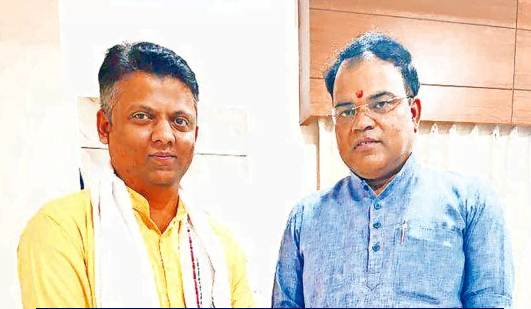BJP Faces Dissent Over Candidate Selection: Alleged Letters Surface in Valsad
In the realm of Indian politics, candidate selection often sparks debates and disagreements within political parties. Recently, the Bharatiya Janata Party (BJP) has found itself embroiled in controversy as alleged letters expressing discontent over the choice of Lok Sabha candidates have surfaced, particularly in Valsad.
Discontent Emerges: Alleged Letters Shake BJP Leadership
The emergence of purported letters addressed to top leaders, including Prime Minister Narendra Modi and Home Minister Amit Shah, has raised eyebrows and stirred tensions within the party ranks. These letters, purportedly penned by party workers, express dissatisfaction with the selection of Dhaval Patel as the BJP candidate for the Valsad Lok Sabha seat.
Accusations Fly: BJP Points Finger at Congress
Amidst the uproar caused by these letters, the BJP has accused Congress workers of orchestrating this dissent to undermine their electoral prospects. However, Congress has vehemently denied any involvement, attributing the dissent to genuine grievances among BJP workers.
Worker Dissent: Calls for Candidate Replacement
The letters, though unsigned, demand the replacement of Dhaval Patel with a candidate who is a resident of Valsad. They highlight the apprehension among workers that fielding an “outsider” could jeopardize their electoral fortunes in both Valsad and Navsari constituencies.
Response from BJP and Congress
While the leadership in Valsad has dismissed the letters as the handiwork of Congress workers, asserting unwavering support for Dhaval Patel, the Congress has seized upon the opportunity to underscore internal discord within the ranks.
Implications and Future Prospects
The emergence of these letters underscores the challenges faced by political parties in navigating internal dissent and managing public perception during election campaigns. As the electoral battleground intensifies, both the and Congress are gearing up to address these issues while focusing on their respective campaign strategies.
Conclusion
The alleged letters surfacing in Valsad serve as a stark reminder of the complexities inherent in candidate selection and party management in the realm of Indian politics. As the political landscape continues to evolve, it remains to be seen how these developments will impact the electoral dynamics and the outcome of the upcoming polls in Valsad and beyond.
